In our survey fielded from March 3 to April 4, 2024 – prior to the Biden administration’s statement about halting the shipment of some arms to Israel – Israelis offer somewhat mixed reviews of President Joe Biden and his actions during the conflict.
For example, while 57% of Israelis express confidence in U.S. President Joe Biden to do the right thing regarding world affairs, a similar share (60%) disapprove of his handling of the ongoing war. Still, roughly seven-in-ten Israelis want the U.S. to play a major role in diplomatically resolving the conflict, more than say this about the United Nations or any other country we asked about.
Confidence in Biden
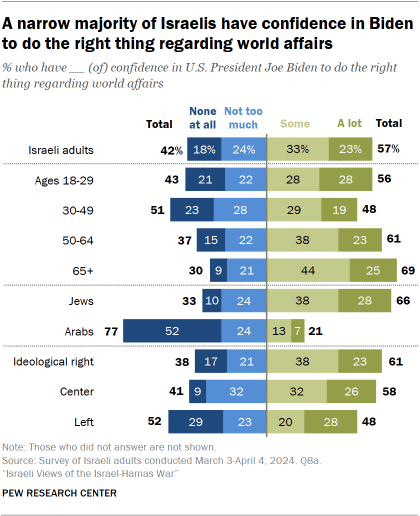
A slim majority of Israelis (57%) have confidence in Biden to do the right thing regarding world affairs.
Overall, older Israelis are more confident in Biden than younger Israelis. For example, among Israelis ages 65 or older, 69% express at least some confidence in Biden, compared with 56% of those ages 18 to 29.
Israelis on the ideological right or center are more confident in Biden than those on the left. About six-in-ten on the right or in the center express confidence in Biden, compared with roughly half of Israelis who place themselves on the left.
Jewish Israelis also have more confidence in Biden than Arab Israelis do (66% vs. 21%). About half of Arabs say they have no confidence at all in Biden to do the right thing on the world stage.
Confidence in Biden is tied to people’s approval of his handling of the Israel-Hamas war. Israelis who approve of his handling of the war are much more confident in him than those who disapprove (92% vs. 33%). Additionally, Israelis who think Biden is striking the right balance between support for Israelis and Palestinians are much more confident in him to do the right thing regarding world affairs (84% confident) than those who say he is favoring Israel too much (36%) or the Palestinians too much (39%).
How views of Biden have changed over time
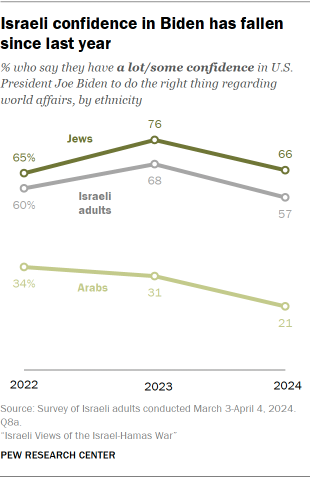
Confidence in Biden among Israelis is down from 68% last year and closer to the share who had confidence in him in 2022 (60%). Israeli Jews’ views follow the same pattern.
In contrast, among Israeli Arabs, views of Biden have declined significantly since 2022. (We were unable to survey in Israel during the first year of Biden’s presidency because of the COVID-19 pandemic.)
While support declined since last year among all ideological groups, the greatest decreases have come among those in the center (down 20 percentage points) and on the left (down 21 points). Meanwhile, confidence among those on the right has fallen much less (down 7 points).
Views of how Biden is handling the Israel-Hamas war
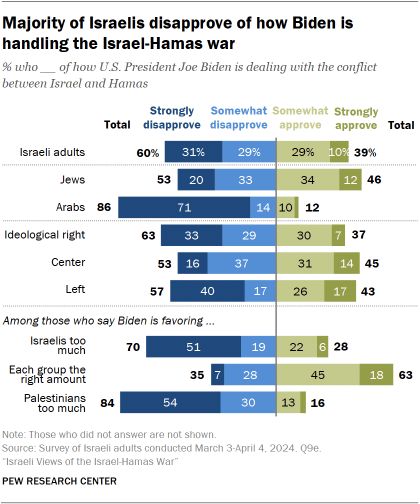
More Israelis disapprove than approve of how Biden is dealing with the conflict between Israel and Hamas (60% vs. 39%).
Arabs in Israel are more critical of Biden’s handling of the war than Jews (86% vs. 53%). Indeed, 71% of Arabs say they strongly disapprove of his approach to the conflict. Views among Jewish Israelis are more mixed.
As with overall confidence in Biden, opinions about which side he favors in the conflict are related to evaluations of how he has handled the war. Those who say Biden is striking the right balance are more likely to approve of his handling of the conflict (63%) than those who say he is either favoring the Israelis (28%) or the Palestinians (16%) too much.
Who is Biden favoring in the conflict, or is he striking the right balance?
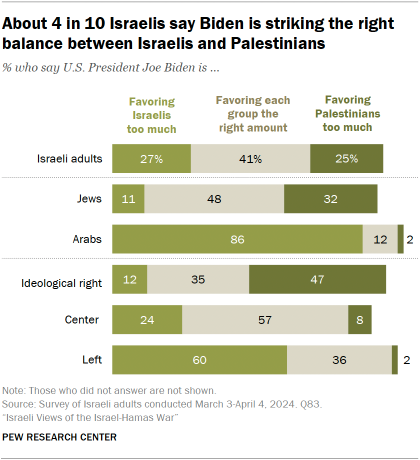
Roughly four-in-ten Israelis say Biden is favoring each group the right amount while roughly a quarter each think he is either favoring the Israelis (27%) or the Palestinians (25%) too much.
Arab Israelis (86%) overwhelmingly say Biden is favoring the Israelis too much. Only 11% of Jewish Israelis share this view. Instead, about half of Jews (48%) say he’s striking the right balance, and an additional 32% say he is favoring the Palestinians too much.
Those on the left are most likely to say Biden favors the Israelis too much, while those in the center are most likely to say he is favoring each group the right amount. Those on the right are most likely to say he is favoring the Palestinians too much.
The largest share of Israelis across age groups say Biden is striking the right balance. However, those ages 50 and older are more likely to say this than those ages 18 to 49 (46% vs. 38%). Younger Israelis are instead more likely than older Israelis to say that Biden is favoring the Israelis too much (30% vs. 22%).
Views of the U.S.
Israelis broadly view the U.S. in a positive light: 77% have a favorable view of the country, including 43% who say they have a very favorable opinion. While the U.S. is still largely popular, the share of Israelis who have a favorable view of it fell 10 points since last year, when 87% held this view.
Demographic patterns in views of the U.S. are similar to confidence in Biden:
- Jewish Israelis are much more likely than Arab Israelis to have a favorable view of the U.S. (90% vs. 29%). Among Arabs, favorability ratings of the U.S. are at an all-time low, having dropped 15 points since 2023.
- Views of the U.S. are generally more positive among Israelis on the ideological right (85%) and center (84%) than on the left (55%). While favorable views are down from last year among those across the ideological spectrum, the decrease is three times larger among those on the left (down 22 points) than those in the center or on the right (both down 7 points).
- Israelis ages 50 and older are more likely than their younger counterparts to have a favorable view of the U.S. (85% vs. 72%).
Additionally, Israelis who have confidence in Biden are more likely to have favorable views of the U.S. than those who have less confidence (97% vs. 51%). Similarly, those who approve of his handling of the Israel-Hamas war have more favorable views of the U.S. than those who disapprove (97% vs. 64%).
Who Israelis want to play a role in diplomatically resolving the war
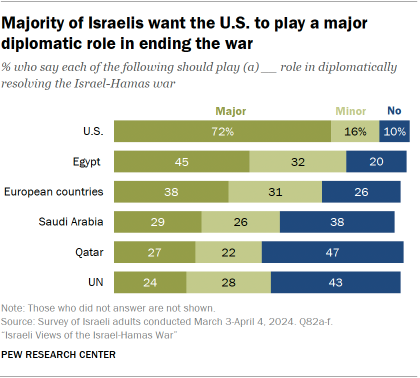
In the survey conducted March 3 to April 4, 2024 – amid off-again, on-again ceasefire negotiations mediated by Egypt and Qatar with involvement by senior U.S. officials – a large majority of Israelis (72%) said the U.S. should play a major role in diplomatically resolving the war between Israel and Hamas.
Egypt received the next largest share of support for diplomatic involvement, with 45% of Israelis saying it should play a major role.
On the other end of the spectrum, just 27% of Israelis support Qatar playing a major role; similar shares say this about Saudi Arabia (29%) and the United Nations (24%).
Support for a major U.S. role is broadly popular across the Israeli ideological spectrum. However, those on the left are more open than those on the right to involvement by other diplomatic actors.
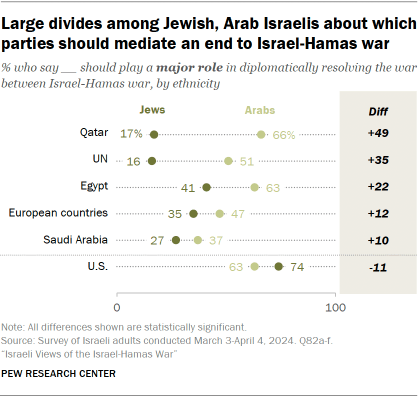
Both Jews (74%) and Arabs (63%) in Israel favor the U.S. playing a major part in resolving the Israel-Hamas war.
However, Arabs are more likely than Jews to support each of the other diplomatic actors asked about playing a major role. In fact, about as many Arab Israelis support Qatar (66%) and Egypt (63%) taking on major roles as support the U.S. doing so (63%).




